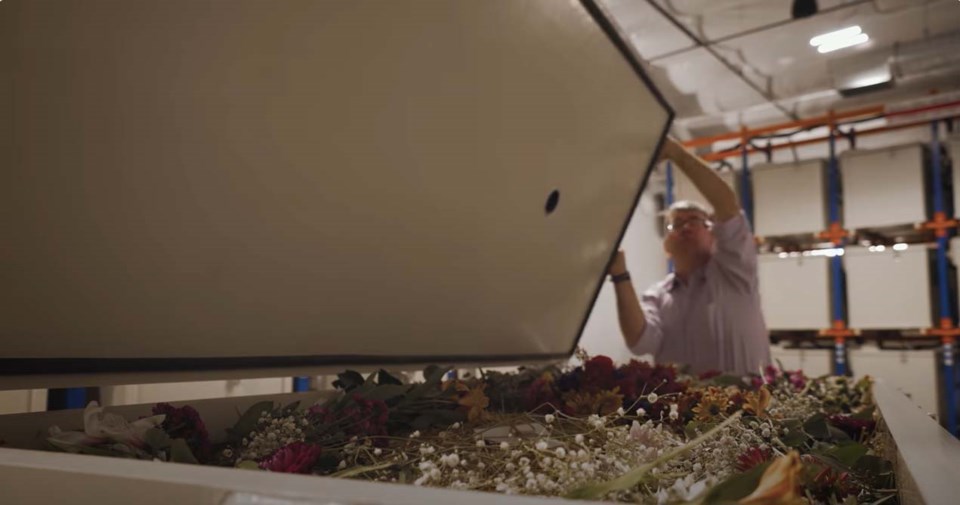Almost four years after provincial regulators asked for feedback about allowing human composting in Ontario — as seven U.S. states now do — a greener alternative to cremation is still not allowed.
Human composting, also called natural organic reduction (NOR) or "terramation," involves putting the body in a container with a large amount of organic material such as straw or alfalfa. After about two months, the body and organic material form about 1.5 cubic metres of compost, which can be scattered, buried or used to plant a tree.
A number of Vancouver Island funeral homes offer a service that involves transferring a body to Washington State, where the process is legal, to be composted.
"Basically, shame on us," said Lorraine Fracy of Royal Oak Burial Park, a Victoria-area cemetery.
"There's something wrong with that. We literally are paying transportation fees to take people into a different country."
Fracy would like to offer composting to families as an option; the cost would be similar to traditional cremation, she said.
But no Canadian jurisdiction allows human composting. In March 2020, the Ontario government asked for public comment on allowing a number of alternative ways of dealing with human remains, but nothing changed as a result, a spokesperson for the Ministry of Public and Business Service Delivery confirmed.
In response to a provincial auditor general's report in 2020, the ministry said it would study new technology for dealing with human remains and is still doing so,
Washington was the first U.S. state to legalize human composting. It has since been followed by some large-population states like New York and California.
Families can find the slow, unhurried process of composting emotionally helpful as they take their time to adjust to a death, said Waterloo-based environment columnist Susan Koswan.
"That is part of the beauty of it," she explained. "Because when you lose someone, you're rushed into doing everything. You're grieving, and you have to make all these tough life decisions.
"I had to do this with my husband: he died suddenly. And it's like, Oh, my God, what do we do? So we just kind of picked the fastest option. But this gives you time and space to breathe."
Fracy agreed. At a Seattle-area composting facility she is familiar with, people will come and reflect as the process takes its slow course, she said.
"They have a much longer time. Not everybody comes to visit those vessels, but it was interesting for me to see the way they were decorated, and to see some that will come and spend time, and sit with the body."
However, prions — agents of rare progressive neurodegenerative disorders — survive the composting process, Ontario Funeral Services Association president John Cunningham points out.
"Proponents of NOR point to its very low environmental impact, including low CO2 emissions. While this is laudable, other aspects of NOR must be considered. Most concerning is public safety: It is known that the prions that cause Creutzfeldt-Jakob disease in humans are destroyed by cremation and aquamation, however, they are not destroyed by earth burial, and thus by composting."
Traditional burial doesn't destroy some pathogens either, he said, but in that case, they aren't disturbed by a process like scattering.
The U.S. does not allow people who died of Ebola, prion diseases such as Creutzfeldt-Jakob disease, and active tuberculosis to be composted.
The problem with that, Cunningham points out, is that someone with Creutzfeldt-Jakob disease can take up to 30 years to show symptoms, and tuberculosis can be present for many years before an active case develops. So someone could die of an unrelated issue without anyone being aware that they have CJD or tuberculosis.
For her part, Kostner sees cremation as polluting, and traditional cemeteries as unsustainable:
"There are a lot of particulates and stuff going into the atmosphere. Most crematoriums are not equipped to have really good scrubbers yet. It could be anything from the stuff in a casket that's burning or plastics, depending on the composition of the casket.
"Burial also causes environmental issues because you've got land tied up, basically forever, for dead people," she said. "I’d like to be composted, and the compost used to plant a tree somewhere, on land that we're trying to restore. That would be ideal — in my mind, it would be perfect for me."




